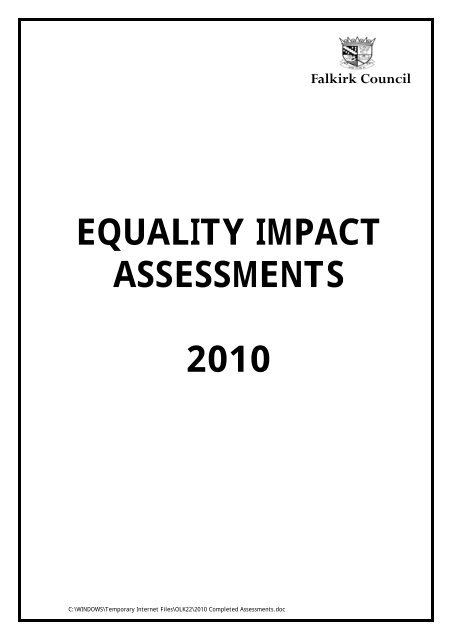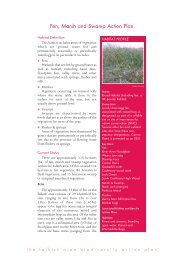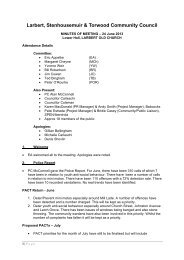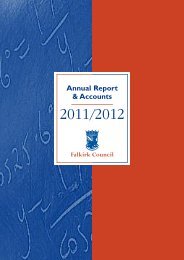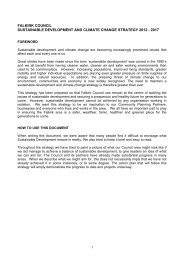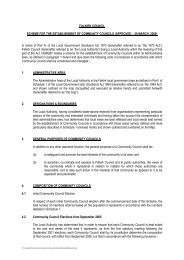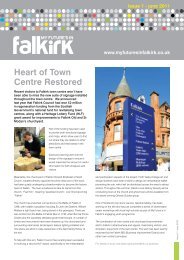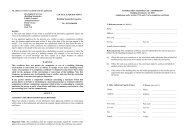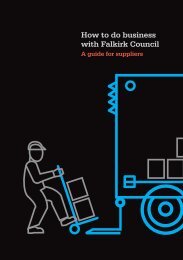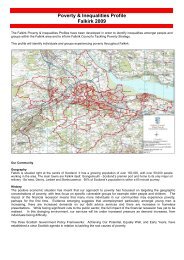EQUALITY IMPACT ASSESSMENTS 2010 - Falkirk Council
EQUALITY IMPACT ASSESSMENTS 2010 - Falkirk Council
EQUALITY IMPACT ASSESSMENTS 2010 - Falkirk Council
Create successful ePaper yourself
Turn your PDF publications into a flip-book with our unique Google optimized e-Paper software.
<strong>EQUALITY</strong> <strong>IMPACT</strong><br />
<strong>ASSESSMENTS</strong><br />
<strong>2010</strong><br />
C:\WINDOWS\Temporary Internet Files\OLK22\<strong>2010</strong> Completed Assessments.doc<br />
<strong>Falkirk</strong> <strong>Council</strong>
The Polices contained in this document are as follows:<br />
- CORPORATE FUNDING REVIEW<br />
- PRIVATE SECTOR HOUSING SCHEME OF ASSISTANCE<br />
- REVENUE BUDGET <strong>2010</strong>/2011<br />
- COMMUNAL REFUGE PROVISION FOR WOMEN FLEEING DOMESTIC ABUSE<br />
and OUT OF HOUR SERVICES PROVIDED BY FALKIRK AND DISTRICT<br />
WOMEN’S AID<br />
- NATIONAL RECRUITMENT PORTAL<br />
- PROPOSAL ON RECRUITMENT OF RETIRED TEACHERS TO SUPPLY WORK<br />
- RECRUITMENT AND SELECTION POLICY<br />
- ASSESSMENT AND ELIGIBILITY FRAMEWORK SERVICES<br />
C:\WINDOWS\Temporary Internet Files\OLK22\<strong>2010</strong> Completed Assessments.doc
POLICY NAME – CORPORATE FUNDING REVIEW<br />
What is the aim, objective or purpose of the policy?<br />
a. Make recommendations on the overall allocation of <strong>Council</strong> resources to external<br />
organisations;<br />
b. Ensure that resources allocated are being used effectively and work towards meeting the<br />
<strong>Council</strong>’s priority outcomes;<br />
c. Ensure that there is a robust process in place to enable Officers to allocate resources in a<br />
consistent, efficient and joined up manner; and<br />
d. Ensure that the local Voluntary Sector is supported and able to adapt to the pressures of<br />
the current financial climate.<br />
The review has been driven by the significant budgetary pressures which the <strong>Council</strong> is<br />
currently under. Recommendations made are for both short and long terms implementation.<br />
Short term recommendations will be implemented immediately (from April <strong>2010</strong>) and will be<br />
consistent across all organisations in receipt of <strong>Council</strong> support.<br />
Longer term recommendations will involve further involvement from all Services and will<br />
ensure that all future funding decisions are made in a way which is transparent and fair, in<br />
line with Service plans and achieve best value. These changes are likely to have a more<br />
targeted impact however will be underpinned by thorough assessment including EQIA.<br />
Who implements the policy?<br />
The Policy is lead by the Funding Team (Corporate & Neighbourhood Services), however,<br />
recommendations from Services and CMT will be considered and final decision will be taken<br />
by Elected Members. The decision will then be implemented by individual Services in<br />
conjunction with Corporate & Neighbourhood and Finance Services.<br />
Person carrying out impact assessment<br />
Lesley McArthur, Funding Officer<br />
Who are the stakeholders or who is intended to benefit from the Policy and in what way<br />
(for example, staff, service users, visitors)?<br />
• <strong>Falkirk</strong> <strong>Council</strong> – savings to budgets in line with current requirements resulting from<br />
current financial climate and pressures;<br />
• Services – Further ability to ensure that all support allocated is working towards <strong>Council</strong><br />
priorities;<br />
• External Organisations – Development of a robust and transparent process of resource<br />
allocation; and<br />
• Service Users – Long term, <strong>Council</strong> will be better placed to develop, target and deliver<br />
services across the <strong>Falkirk</strong> <strong>Council</strong> area achieving better outcomes to those most in need.<br />
What data is available to facilitate the screening of the policy? Note: Gathering of<br />
information/evidence can include community consultation, research (including<br />
websites), Officer knowledge/experience, Equalities monitoring data, service user<br />
feedback (including complaints) and partner agency feedback.<br />
• Collation of information from Services regarding support and funding made to external<br />
organisations;<br />
• Report to CMT presenting options and recommendations;<br />
• Report to <strong>Council</strong> Administration;<br />
C:\WINDOWS\Temporary Internet Files\OLK22\<strong>2010</strong> Completed Assessments.doc
• Report to P&R;<br />
• Small Grant Terms and Conditions; and<br />
• Joint Working Agreements.<br />
Is there any evidence of higher or lower uptake or exclusion by any of the equality<br />
strands? Note: A broad interpretation should be taken of the word 'evidence'. It should<br />
include anecdotal evidence and evidence derived from qualitative or quantitative<br />
analysis where available.<br />
Information will be gained through further investigation and assessment on a service specific<br />
basis.<br />
Does evidence indicate access to services and benefits are reduced or denied for some<br />
groups?<br />
Decision is consistent across all groups and organisations. No targeting or variance has been<br />
applied to any particular group.<br />
Do particular groups face increased difficulty or indignity as a result of the Policy?<br />
Decision is consistent across all groups and organisations. No targeting or variance has been<br />
applied to any particular group.<br />
Are there any higher complaints or lower satisfaction rates from particular groups in<br />
connection with the policy?<br />
Information will be gained through further investigation and assessment on a service specific<br />
basis.<br />
Is there any evidence that the policy fails to respond to the needs of a particular group?<br />
Services should base all decisions to support organisations on need and available resources.<br />
The decisions taken within this review have been made due to significant budgetary pressures<br />
placed on the <strong>Council</strong>. Decision is consistent across all groups and organisations. No<br />
targeting or variance has been applied to any particular group.<br />
The funding cuts are proportionate to what organisations receive, with 3%* being cut from<br />
organisations’ budgets for <strong>2010</strong>. Services will be working with the organisations to discuss<br />
requirements and target resources and funding to appropriate areas of need.<br />
Where are there gaps in data or non-availability of data which would need to be gathered<br />
in the future to ensure effective monitoring?<br />
We will incorporate a recommendation that further EQIA’s must be part of the ongoing<br />
decision making process within any allocation of support to external organisations. This will<br />
be a Service specific requirement that should be applied to all organisations and group at the<br />
point of establishing a funding agreement. This is particularly relevant to groups who receive<br />
funding over a period of more than 1 year where the <strong>Council</strong> may have to make budgetary<br />
decisions due to external pressures which may have a negative impact on the organisation,<br />
its ability to deliver services and therefore service users.<br />
Considering all the information above, please indicate areas where a differential impact<br />
occurs or has the potential to occur. Note: Include details on any potential or actual<br />
positive impacts as well as potential or actual negative impacts.<br />
This information will be identified through further EQIA’s on a service specific basis.<br />
C:\WINDOWS\Temporary Internet Files\OLK22\<strong>2010</strong> Completed Assessments.doc
Recommend for full impact assessment (Yes or No). Note: The answers to Questions 6-10<br />
should be considered to determine if a full impact assessment is required.<br />
YES – see below<br />
If you have identified adverse impact, could this amount to unlawful discrimination? (If<br />
not, explain why not).<br />
The decisions made within the Corporate funding review will be implemented consistently<br />
across all allocations of support to groups and organisations therefore there which there may<br />
be an overall negative impact, no one group have been targeted. It is therefore anticipated<br />
that the impact will be proportionately the same across all groups.<br />
It has been recommended that the funding at <strong>Falkirk</strong> process is improved to ensure that a<br />
more robust risk based process be introduced at the point of allocating funding. This will<br />
include an Equalities Impact Assessment for each allocation. This will be the responsibility of<br />
the sponsor service.<br />
If the policy intends to result in different outcomes for different groups by using positive<br />
action to redress disadvantages, is this lawful? (Confirm what positive action is being<br />
taken and why).<br />
One of the recommendations of the review is that the small grants budgets are consolidated.<br />
This will result in a transparent and robust process, with criteria set in line with <strong>Council</strong><br />
priorities. Clear guidance will be available to groups.<br />
The consolidation of the small grants budgets should have no adverse impact on any<br />
particular organisation as these funding requests are on an as required basis by organisations<br />
in relation to particular projects they are involved in. There is no specific amount allocated<br />
to each organisation and decisions are based on the nature of the funding request. This<br />
process will continue.<br />
Consultation/Involvement carried out (methods, target groups etc). (Identify who was<br />
involved in the process, what feedback was received and how this feedback was used).<br />
Consistent information was gathered from Services using a template. Where gaps were<br />
identified in the completion of the template Services were given opportunity to provide<br />
further information.<br />
There has not been consultation with groups or organisations as the final decision of the<br />
funding review is based on significant budgetary pressures which the <strong>Council</strong> is currently<br />
under. In addition, consistency has been applied in terms of the decision taken so no groups<br />
have been specifically targeted or will be proportionally more disadvantaged.<br />
Proposed method to reduce or eliminate adverse impact (including reasons chosen).<br />
(Explain what action is being taken or planned to reduce adverse impact).<br />
Consultation will take place during <strong>2010</strong> with groups and organisations in relation to the use<br />
of allocated funding and resources for the longer term. This information will be used to<br />
inform future decisions through a further EQIA process.<br />
C:\WINDOWS\Temporary Internet Files\OLK22\<strong>2010</strong> Completed Assessments.doc
Priority - High/Medium/Low<br />
Medium<br />
For the following questions, tick areas of equality relevance (tick boxes will refer to<br />
equality strands – Race, Gender, Disability, Age, Sexual Orientation, Religion/Belief,<br />
None)<br />
Risk of adverse impact – data used including assessment of reliability/validity<br />
None<br />
Assessment of adverse impact<br />
None<br />
Conclusions and recommendations for amendments to the policy.<br />
The funding decision has been made by CMT and approved by Elected Members for <strong>2010</strong> and<br />
will be implemented as part of the <strong>2010</strong>/2011 budget process.<br />
Further review of ongoing funding and resources for individual organisations will take place<br />
during <strong>2010</strong> and Services will work with external organisations in this respect.<br />
Timescales for implementation<br />
April <strong>2010</strong><br />
C:\WINDOWS\Temporary Internet Files\OLK22\<strong>2010</strong> Completed Assessments.doc
POLICY NAME – PRIVATE SECTOR HOUSING SCHEME OF ASSISTANCE<br />
Background<br />
This replaces the repair and improvement grants scheme for private housing from 1 April<br />
<strong>2010</strong>. It is required under the Housing (Scotland) Act 2006. The relevant duties are:<br />
• to comply with Adaptation grants regulations for disabled people and to publish:<br />
• within the Local Housing Strategy, a strategy for improving housing conditions by<br />
providing or arranging for the provision of assistance - Section 10(c)<br />
• a public Statement of Assistance – reflecting the principles of the strategy and informing<br />
the public of the availability of assistance and access criteria for Adaptations and help<br />
with repairs - Section 72.<br />
What is the aim, objective or purpose of the policy?<br />
The Scheme of Assistance should address two aims:<br />
a. To improve private sector housing conditions.<br />
b. To increase the number of disabled people able to live more independently through the<br />
provision of major adaptations to private housing.<br />
Who implements the policy?<br />
• Private Sector Housing Staff (Corporate & Neighbourhood Services)<br />
• Social Work Services Community Care and Children & Families staff (Social Work Services)<br />
Person carrying out impact assessment<br />
Lorna Fleming<br />
Who are the stakeholders or who is intended to benefit from the Policy and in what way<br />
(for example, staff, service users, visitors)?<br />
• Disabled people living in (or intending to live in) owner occupied and privately rented<br />
housing are intended to benefit by gaining financial and practical assistance, advice and<br />
information for the purpose of major adaptations to a home to meet their needs.<br />
• Home Owners, Private Landlords and Private Tenants including disabled people, are<br />
intended to benefit by gaining information, advice, practical assistance or financial<br />
assistance with improving their housing conditions / reducing disrepair.<br />
• Private Landlords may not generally benefit from financial assistance due to State Aid<br />
rules governing the type of financial assistance local authorities can give to private<br />
enterprises. They can benefit from other forms of assistance however.<br />
• The Scottish Government and local groups or organisations representing disabled people,<br />
local traders, older people, home owners, and other groups are also considered<br />
stakeholders.<br />
C:\WINDOWS\Temporary Internet Files\OLK22\<strong>2010</strong> Completed Assessments.doc
What data is available to facilitate the screening of the policy? Note: Gathering of<br />
information/evidence can include community consultation, research (including<br />
websites), Officer knowledge/experience, Equalities monitoring data, service user<br />
feedback (including complaints) and partner agency feedback.<br />
The screening of the policy took into account the following:<br />
1. All Tenure Local House Condition Survey of the <strong>Falkirk</strong> Area (2009) carried out on basis of<br />
a 3% sample.<br />
2. Community Consultation Data which included a Focus Group, Survey of Disabled<br />
People/their carers and survey of private households and identified groups (Appendix 1).<br />
Further details of the consultation process and feedback are included through the EQIA.<br />
Is there any evidence of higher or lower uptake or exclusion by any of the equality<br />
strands? Note: A broad interpretation should be taken of the word 'evidence'. It should<br />
include anecdotal evidence and evidence derived from qualitative or quantitative<br />
analysis where available.<br />
The current Grants application form (previously prescribed by ministers) for repair and<br />
adaptations, does not ask for equalities data.<br />
Equalities data was collected for all three aspects of the consultation. The Scottish<br />
Government’s recommended questions for disability gender and age, and the revised Census<br />
ethnicity classifications were used. The comparison between the 2001 Census data and<br />
respondents to the consultation were as follows:<br />
<strong>Falkirk</strong> Area (2001 Census):<br />
Ethnicity - 99.19% of the population were White Scottish, Other White British or White Irish.<br />
Age – under 44 – 59.67%, 45-59 – 19.56%, 60-74 – 14.02%, 75+ - 6.76%<br />
Disability – 21.19% had a limiting long term illness and 7.9% had an economic status of<br />
permanently sick or disabled.<br />
Gender – Male – 48.2%, Female, 51.8%<br />
Respondents to Adaptations Focus Group:<br />
All participants considered themselves to have a limiting long term illness or disability. Whilst<br />
a variety of age ranges and ethnic groups were invited, no ethnic minorities or younger age<br />
groups were present. The average age of participants was 73, with 4 female and 2 male, 1<br />
unrecorded. Participation was widened through the survey as follows:<br />
Respondents to Adaptations Survey:<br />
Those that supplied equalities information were comprised as follows:<br />
Ethnicity - 32 classified themselves as white Scottish or white British. 3 respondents<br />
(representing around 9% of respondents) can be considered to be ethnic minorities (White<br />
Polish; Pakistani, and Other Ethnic Group (Scottish & North African)).<br />
Age -<br />
On behalf of<br />
child under 16
Age
Do particular groups face increased difficulty or indignity as a result of the Policy?<br />
The Scheme of Assistance is likely to broaden the range of types of assistance available to<br />
help owners meet their responsibilities for repairs and maintenance; and it ensures disabled<br />
people can access proper advice on funding work not covered by mandatory grant. The duty<br />
to publish a Statement of Assistance will make access criteria for assistance more<br />
transparent.<br />
Are there any higher complaints or lower satisfaction rates from particular groups in<br />
connection with the policy?<br />
This information will require to be gathered once the Scheme of Assistance is implemented<br />
from 1 April <strong>2010</strong> via customer satisfaction surveys and reviewed prior to the 2011 Local<br />
Housing Strategy and regularly thereafter.<br />
Is there any evidence that the policy fails to respond to the needs of a particular group?<br />
No. The evidence from the surveys suggest the new Scheme of assistance will respond to the<br />
needs of more groups – those facing non financial barriers as well as financial barriers in<br />
tackling disrepair. The local all tenure house condition survey 2009 suggested that various<br />
non financial barriers were an issue for around a third of owners. This suggests that the<br />
Scheme of Assistance will better respond to the needs of the community in comparison with<br />
the existing repair and improvement grants scheme.<br />
Where are there gaps in data or non-availability of data which would need to be gathered<br />
in the future to ensure effective monitoring?<br />
Addressing the evidence gap in future:<br />
Two changes can help address the lack of evidence about whether equalities groups are<br />
having difficulty / differential access, in future:<br />
• Questions about access and satisfaction can be incorporated into revised customer<br />
satisfaction surveys at the end of the Adaptations process, to make sure that any<br />
differences in terms of equalities groups can be identified.<br />
• Individuals accessing any practical assistance services or grants for repairs can be<br />
provided with a customer satisfaction survey to ensure continual monitoring in terms of<br />
differences between accessibility and satisfaction of equalities groups.<br />
Revised customer satisfaction requires will be introduced to enable differences between<br />
equalities groups to be checked in terms of satisfaction / access to services for assistance<br />
with disabled adaptations and priority repair work.<br />
Considering all the information above, please indicate areas where a differential impact<br />
occurs or has the potential to occur. Note: Include details on any potential or actual<br />
positive impacts as well as potential or actual negative impacts.<br />
Negative impacts<br />
Potentially reduced access for low income home owners for discretionary grants (ie those<br />
which the <strong>Council</strong> does not have a duty under the 2006 Act to provide) if they can access<br />
private finance on fair affordable terms. This change is in keeping with government<br />
guidance. It will free up resources for non-financial assistance and for using new powers,<br />
which is intended to assist more households than through grants alone.<br />
Positive Impacts – Disabled People requiring Major Adaptations<br />
• Further involvement - improvements to the layout and format of information leaflets<br />
were suggested at the focus group and just under three quarters of survey respondents<br />
have volunteered to assist with this process by giving feedback on new draft versions.<br />
C:\WINDOWS\Temporary Internet Files\OLK22\<strong>2010</strong> Completed Assessments.doc
• Improving Information and Advice – the availability and accessibility of information and<br />
advice about finance sources and alternative housing options (from an all tenure<br />
perspective) can be improved by offering this service earlier in the process to all<br />
potential applicants. This approach will be further developed in the forthcoming 2011-16<br />
Local Housing Strategy.<br />
• New Service Standards - the consultation process generated a number of new Service<br />
Standards against which performance can be measured using service user satisfaction<br />
surveys, e.g. “Individuals feel kept up to date at all stages of the process”. Once<br />
implemented, the service standards will increase transparency about the quality of<br />
service being delivered.<br />
Positive Impacts – Repairs and Maintenance<br />
• Priority for assistance will now be on the basis of local priorities generated through the<br />
consultation process.<br />
• More people will be assisted through information, advice and practical assistance than<br />
through grants alone.<br />
Recommend for full impact assessment (Yes or No). Note: The answers to Questions 6-10<br />
should be considered to determine if a full impact assessment is required.<br />
A full impact assessment is not required.<br />
If no, please outline reason for decision.<br />
The justification for this decision includes:<br />
• Steps will be taken as identified above to collect equalities data on an ongoing basis to<br />
monitor whether certain groups may have difficulty accessing assistance when the new<br />
Scheme is introduced from 1 April <strong>2010</strong>.<br />
• The consultation process about the change has already identified a number of service<br />
improvements that can be put in place to improve the service for disabled people.<br />
• Respondents to the Scheme of Assistance consultation process did not identify any<br />
particular equalities groups that could be adversely affected by the changes.<br />
If you have identified adverse impact, could this amount to unlawful discrimination? (If<br />
not, explain why not).<br />
No, feedback from the relevant consultation and focus groups did not identify any particular<br />
equalities groups that could be adversely affected by the changes. All potential issues raised<br />
have been considered through the focus group feedback and taken into consideration for the<br />
Scheme.<br />
If the policy intends to result in different outcomes for different groups by using positive<br />
action to redress disadvantages, is this lawful? (Confirm what positive action is being<br />
taken and why).<br />
No positive action is intended to be taken.<br />
C:\WINDOWS\Temporary Internet Files\OLK22\<strong>2010</strong> Completed Assessments.doc
Consultation/Involvement carried out (methods, target groups etc).<br />
a) Focus Group with disabled people and carers previously involved in adaptations process.<br />
(July 2009)<br />
b) Survey of disabled people / their carers about major adaptations – all former grant<br />
applicants invited to complete survey plus social work clients and via website, to widen<br />
participation after focus group. (October 2009)<br />
c) Survey about overall options for Scheme of Assistance - to 1000 randomly selected private<br />
households, and all groups listed in Appendix 1. Survey was placed on <strong>Council</strong> website and<br />
there were various public open sessions throughout the area.<br />
Proposed method to reduce or eliminate adverse impact (including reasons chosen).<br />
(Explain what action is being taken or planned to reduce adverse impact).<br />
As per question 14 (Screening), the following steps are being taken:<br />
• Equalities data will be collected on an ongoing basis to monitor whether certain groups<br />
may have difficulty accessing assistance when the new Scheme is introduced from 1 April<br />
<strong>2010</strong>.<br />
• Improvements to the service have been identified through the consultation process and<br />
will be implemented accordingly.<br />
Priority High/Medium/Low<br />
Medium<br />
For the following questions, tick areas of equality relevance (tick boxes will refer to<br />
equality strands – Race, Gender, Disability, Age, Sexual Orientation, Religion/Belief,<br />
None)<br />
Risk of adverse impact – data used including assessment of reliability/validity<br />
Race - None<br />
Gender - None<br />
Disability – Medium<br />
Age - Medium<br />
Sexual Orientation - None<br />
Religion/Belief - None<br />
Assessment of adverse impact<br />
Race - None<br />
Gender - None<br />
Disability – Medium<br />
Age - Medium<br />
Sexual Orientation - None<br />
Religion/Belief - None<br />
Conclusions and recommendations for amendments to the policy.<br />
The policy will take into account the positive impacts identified as per Q12 (Screening) in<br />
relation to improvements to the layout and format of information leaflets, improving<br />
information and advice and implementing new service standards.<br />
C:\WINDOWS\Temporary Internet Files\OLK22\<strong>2010</strong> Completed Assessments.doc
Elected members agreed the Scheme of Assistance strategy (from a choice of 3 options<br />
reflecting the consultation) at Housing & Social Care Committee on 2 February 2009 and<br />
Policy & Resources Committee 9 February 2009. Agreement was on the basis that any<br />
amendments to the strategy identified by the impact assessment would be reported and<br />
agreed if necessary.<br />
Timescales for implementation<br />
1 April <strong>2010</strong>.<br />
Methods of publication<br />
<strong>Falkirk</strong> <strong>Council</strong> Web Site<br />
Printed for distribution in <strong>Council</strong> offices<br />
Monitoring arrangements<br />
Two monitoring arrangements will be introduced based on the outcomes of the consultation<br />
and screening process:<br />
• Service User surveys at the end of the adaptations process<br />
• Service user surveys after receipt of financial or practical assistance has been received<br />
for repairs<br />
These arrangements will help identify any access issues affecting equalities groups; measure<br />
performance against service standards and highlight areas of services for improvement.<br />
Date of next review (Month and Year)<br />
1 April 2011<br />
C:\WINDOWS\Temporary Internet Files\OLK22\<strong>2010</strong> Completed Assessments.doc
POLICY NAME – REVENUE BUDGET <strong>2010</strong>/2011<br />
What is the aim, objective or purpose of the budget?<br />
To ensure appropriate allocation of <strong>Council</strong> funds to meet service delivery requirements<br />
based on the availability of resources and revenue.<br />
Who implements the budget?<br />
<strong>Council</strong> Services<br />
Name of person(s) carrying out assessment?<br />
Dougie McGregor (Accounting Manager)<br />
Pauline McGrellis (HR Adviser - Policy)<br />
Jackie McAuley (HR Adviser – Policy)<br />
Service Directors<br />
Who are the stakeholders or who is intended to benefit from the budget proposals and in<br />
what way (for example, staff, service users, visitors)?<br />
<strong>Council</strong> employees, residents/service users within and visitors to the <strong>Falkirk</strong> area.<br />
What data is available to facilitate the assessment of the budget proposals? Note:<br />
Gathering of information/evidence can include community consultation, research<br />
(including websites), Officer knowledge/experience, Equalities monitoring data, service<br />
user feedback (including complaints) and partner agency feedback.<br />
The budget strategy has been formulated on the basis of the revised level of government<br />
grant and the continuing cost pressures facing the <strong>Council</strong> including:-<br />
• Effects of the £3.6m reduction in revenue grant<br />
• Single Status/Equal Pay<br />
• Further 2% Efficiency Savings to be found<br />
• Revenue implications of the capital programme<br />
• New Schools (NPDO) project affordability gap<br />
• Continuing significant rising costs as a consequence of an increasingly elderly population,<br />
looked after children and homelessness in particular<br />
• General price changes particularly in pay awards, energy, rates (following revaluation)<br />
and Landfill Tax<br />
• Reduction in Income e.g. Planning Fees due to the deteriorating economic climate<br />
• Reduction in <strong>Council</strong> Tax income due to the slowing down in house building<br />
• Concordat commitments<br />
Other data available are the risks facing the <strong>Council</strong> which include outstanding Equal Pay<br />
claims and the ever increasing pressures on the Social Work and Education budgets,<br />
exacerbated by continuing real term reductions in grant support over the next three to four<br />
years at least. Taking all of these factors into account there is an estimated shortfall of<br />
c£10m which requires to be addressed<br />
The Budget strategy has required all areas of expenditure and income to be subject to<br />
detailed scrutiny with the emphasis on protecting frontline services and included:-<br />
C:\WINDOWS\Temporary Internet Files\OLK22\<strong>2010</strong> Completed Assessments.doc
• Directors identifying savings of c£2.5m (excl. Employee costs)<br />
• Reducing Employee Costs through the scheme of voluntary severance being pro-actively<br />
considered as a means of reducing costs, together with other potential savings from<br />
restructuring, temporary staff, overtime etc. and also that conditions of service continue<br />
to be reviewed in the context of the <strong>Council</strong>’s objective of protecting employees jobs<br />
(c£2m)<br />
• Maximising income through reviewing existing fees and charges (c£1m) and examining the<br />
potential to generate more income through the introduction of new charges (c£1m)<br />
• Reducing the provision for pay awards still to be negotiated to 1% (c£1.5m)<br />
• Seeking a contribution of savings from Joint Boards (£0.75m)<br />
• Increased savings in borrowing costs (£0.5m)<br />
• Additional income from <strong>Council</strong> Tax collection (£0.3m)<br />
• Reducing the c£7m funding provided to all external organisations by 3% (£0.2m)<br />
Where are there gaps in data or non-availability of data which would need to be gathered in<br />
future to ensure effective monitoring?<br />
Considering all the proposals, please indicate areas where a differential impact occurs or<br />
has the potential to occur. Note: Include details on any potential or actual positive<br />
impacts as well as potential or actual negative impacts.<br />
• Does evidence indicate access to services and benefits are reduced or denied<br />
for some groups?<br />
• Do particular groups face increased difficulty or indignity as a result of the<br />
Policy?<br />
Proposals which may potentially have an adverse impact on particular groups/equality<br />
strands are noted below:<br />
Grants to External Organisations<br />
Each year the <strong>Council</strong> provides assistance by way of grants, funding and support in kind to a<br />
range of third party organisations. The positive contribution these organisations make to the<br />
lives of individuals and communities is considerable. However, the <strong>Council</strong> cannot continue<br />
to fund external organisations at current levels while taking difficult decisions about core<br />
services. Nationally there is also recognition by the voluntary sector that the reductions in<br />
public sector funding will necessitate these organisations being more efficient and effective<br />
in delivering their services. To this end it is proposed that the <strong>Council</strong> reduces its<br />
expenditure for payments to each third sector organisation by 3%. This will be applied to<br />
organisations that receive annual funding and also to the small grants budgets.<br />
Education<br />
Proposals for increases in Fees & Charges in respect of School Meals and Childcare have been<br />
reflected within the budget. It is proposed that charges are also introduced for lunches<br />
within Special Schools. <strong>Falkirk</strong> <strong>Council</strong>, however, still has one of the lowest School Meal<br />
charges of any local authority in the United Kingdom. The increase in meal charges equates<br />
to an additional (maximum) £0.15 per day.<br />
Social Work<br />
It is proposed that the <strong>Council</strong> factors into the <strong>2010</strong>/11 budget considerations for the<br />
introduction of a charging policy for adult social care services which would partially offset<br />
the costs associated with providing these services. In 2006, <strong>Falkirk</strong> <strong>Council</strong> took the decision<br />
to withdraw charges from the majority of adult social care services. Since then the pressures<br />
on the Social Work budget arising from increased costs and increased demands for care have<br />
been substantial. Since 2006, the Social Work overspend has increased year on year, as<br />
outlined below.<br />
2006/07 2007/08 2008/09 2009/10<br />
£0.83m £1.66m £3.25m £4.1m (estimated)<br />
C:\WINDOWS\Temporary Internet Files\OLK22\<strong>2010</strong> Completed Assessments.doc
The budget proposal also includes £0.25m savings arising from the recommendation to the<br />
Housing and Social Care Committee of 2 February to discontinue funding for Barnardo’s<br />
Matrix, Children First Family Group Conferencing Service and FDAMH Time Out Service.<br />
Development Services<br />
Changes to fees and charges are proposed including Transport Planning and Roads Permits. In<br />
particular, there are proposed charges for Blue Badges which may have an impact on<br />
individuals with a disability who are eligible to receive or apply for a Blue Badge.<br />
Community Services<br />
It is proposed that charges for sports and leisure facilities will increase by 15% (this equates<br />
to an increase of approx £0.40 per adult and £0.20 per child for example to use swimming<br />
facilities), however, this will still be below the Scottish average.<br />
It is also recognised that many groups within Community Education Centres enjoy free access<br />
to the facilities. It is proposed that the existing charging policy be reviewed and an<br />
appropriate fee is charged in line with the fees and charges in similar facilities.<br />
The Service currently provides two mobile libraries that cover routes around the district.<br />
With the opening of a new Library in the area, coupled with the continued provision of the<br />
Homebound Service, it is felt that the service can be reduced by one vehicle and the routes<br />
and lengths of stops adjusted accordingly. The requirement for only one mobile library will<br />
result in savings of £0.090m.<br />
General<br />
Despite the difficulties of having to find savings of this magnitude, it is also important to<br />
recognise that the budget continues to increase investment in a number of priority areas<br />
including:-<br />
• Increasing the number of teachers to reduce class sizes<br />
• Provision of a free nutritious meal to P1-P3 pupils in those schools with pupils<br />
experiencing high levels of deprivation<br />
• Four new Secondary Schools with enhanced community facilities<br />
• Increased investment in Social Work services including:- Care for the Elderly, Looked<br />
After Children, Carer Support & Kinship Care<br />
• Additional investment in the three year Capital Programme towards schools; roads;<br />
economic development; culture & leisure strategy etc<br />
If you have identified an adverse impact, could this amount to unlawful discrimination?<br />
(If not, explain why not).<br />
• Outline the proposed method to reduce or eliminate adverse impact (explain<br />
what action is being taken or planned to reduce adverse impact).<br />
There is no evidence to suggest that any of the potential adverse impact identified could<br />
amount to unlawful discrimination. Proposed methods to reduce or eliminate the potential<br />
adverse impact are noted below:<br />
Grant/Funding decision<br />
As part of this process, an equality impact assessment (EQIA) was undertaken in relation to<br />
this proposed decision which has been driven by the significant budgetary pressures which<br />
the <strong>Council</strong> is currently under. Longer term recommendations will involve further<br />
involvement from all Services and will ensure that all future funding decisions are made in a<br />
way which is transparent and fair, in line with Service plans and achieve best value. These<br />
changes are likely to have a more targeted impact however will be underpinned by thorough<br />
assessment including EQIA.<br />
The decisions made within the Corporate funding review will be implemented consistently<br />
across all allocations of support to groups and organisations therefore whilst there may be an<br />
overall negative impact, no one group has been targeted. It is therefore anticipated that the<br />
impact will be proportionately the same across all groups.<br />
C:\WINDOWS\Temporary Internet Files\OLK22\<strong>2010</strong> Completed Assessments.doc
The consolidation of the small grants budgets should have no adverse impact on any<br />
particular organisation as these funding requests are on an as required basis by organisations<br />
in relation to particular projects they are involved in. There is no specific amount allocated<br />
to each organisation and decisions are based on the nature of the funding request. This<br />
process will continue.<br />
The review incorporated a recommendation that further EQIA’s must be part of the ongoing<br />
decision making process within any allocation of support to external organisations. This will<br />
be a Service specific requirement that should be applied to all organisations and group at the<br />
point of establishing a funding agreement. This is particularly relevant to groups who receive<br />
funding over a period of more than 1 year where the <strong>Council</strong> may have to make budgetary<br />
decisions due to external pressures which may have a negative impact on the organisation,<br />
its ability to deliver services and therefore service users.<br />
Education<br />
However, it should also be noted that a provision of £0.08m has been made to extend<br />
entitlement to free school meals to all children in P1-P3 in those schools with pupils<br />
experiencing high levels of deprivation including those within Special Schools.<br />
Social Work Service Charges<br />
An equality impact assessment and consultation/involvement exercise will take place in<br />
respect of any proposed charges. Any charges made will be in line with the COSLA guidance<br />
which will ensure consistency in the application of fees as well as ensuring that any<br />
particular circumstances of vulnerable groups are taken into account.<br />
Development Service Charges<br />
Any proposals to implement charges in respect of Blue Badges will be subject to an equality<br />
impact assessment to determine the potential impact.<br />
Community Service Charges<br />
Budgets have been increased by £0.070m to provide for the full costs of community use at<br />
the four new secondary schools and the sports hall at the old Denny High School. In addition,<br />
provision of £0.075m has been made for the revenue funding for the new sports facility at<br />
Bankier. The budget has also been adjusted by £0.272m to reflect the transfer of the local<br />
regeneration budget from Scottish Enterprise to local authorities.<br />
Concessions in relation to the use of the free leisure card for over 60s and those eligible<br />
through various benefits will still apply.<br />
It is proposed that a phased approach is taken in implementation to allow groups time to<br />
adjust their own fee mechanisms to reflect the new charges. Any decision taken will be<br />
assessed and an equality impact assessment undertaken to determine any potential adverse<br />
impact on particular community groups.<br />
In terms of the removal of 1 mobile library, the potential impact on elderly or disabled<br />
customers who use the mobile service will be offset by the continued provision of the<br />
homebound service and extended route of the remaining mobile library.<br />
C:\WINDOWS\Temporary Internet Files\OLK22\<strong>2010</strong> Completed Assessments.doc
What evidence is used to support budget proposals?<br />
Social Work Charges<br />
Other <strong>Council</strong>s have experienced significant difficulties but have managed to offset these<br />
pressures by the adoption of a fair and equitable charging policy. COSLA produces annual<br />
guidance in relation to charging for non-residential adult social care services. Their most<br />
recent survey indicates that <strong>Falkirk</strong> <strong>Council</strong> is unusual in not charging for the majority of such<br />
services.<br />
Discontinuation of services (Social Work)<br />
The proposed discontinuation of 3 services by Social Work has been made in relation to the<br />
uptake of these services in addition to the opportunity for these to be provided by other<br />
options (internally and externally).<br />
For instance, the Barnardo’s Matrix service provided support to a maximum of 6 families in<br />
the current year at a cost of £93,450. Plans are now being developed for the introduction of<br />
a locality model for Children’s Services in <strong>Falkirk</strong> and for the introduction of an Intensive<br />
Support Service which will represent Best Value.<br />
The discontinuation of the Children’s First Family Group Conferencing Service is based on the<br />
option to provide this internally via the Intensive Family Support Service also and it is no<br />
longer required as a stand-alone service.<br />
The number of call received by FDAMH Time Out service are on average 4 to 5 calls per night,<br />
with the majority of callers are known to and supported by other services. Additional<br />
external support for the same service is now available through a number of other options<br />
such as Breathing Space, Saneline, Cruse, Samaritans and the Intensive Home Treatment<br />
Team.<br />
Scottish Government Blue Badge Scheme guidance confirms that Local Authorities have the<br />
option to make a charge to cover the administration costs of issuing a Blue Badge. There is<br />
currently no charge made by <strong>Falkirk</strong> <strong>Council</strong>, however, proposed charges have been<br />
introduced to cover for<br />
Consultation/Involvement carried out (methods, target groups etc). (Identify who was<br />
involved in the process, what feedback was received and how this feedback was used).<br />
Internal consultation taken place with Trade Unions. During these difficult times of severe<br />
financial constraints it is even more important to ensure proper consultation with the<br />
recognised Trade Unions and they have acknowledged the effort made to keep them<br />
informed particularly in relation to matters directly involving their members, such as<br />
voluntary severance and conditions of service.<br />
No external consultation has taken place in respect of the general budget, however,<br />
individual consultation and involvement processes will take place in respect of specific<br />
proposals (for example, introduction of charges within Social Work, Funding reviews and<br />
charges for Blue Badges).<br />
If the budget proposals intend to result in different outcomes for different groups by<br />
using positive action to redress disadvantages, is this lawful? (Confirm what positive<br />
action is being taken and why).<br />
No positive action is proposed as part of the assessment process.<br />
C:\WINDOWS\Temporary Internet Files\OLK22\<strong>2010</strong> Completed Assessments.doc
Conclusions and recommendations for the implementation of the budget proposals<br />
(including any changes made).<br />
The budget for <strong>2010</strong>/11 has proved to be the most challenging for many years. The cost<br />
pressures highlighted, together with the requirement to find additional savings as a result of<br />
the economic downturn has resulted in the <strong>Council</strong> having to make difficult decisions on<br />
where to make savings.<br />
Employee costs in particular represent the largest element of the <strong>Council</strong>’s expenditure and<br />
the budget therefore inevitably reflects significant savings in this area. Continuing pressures,<br />
particularly in Social Work have been recognised through additional investment and the<br />
proposed generation of additional income. The ongoing potential cost of Equal Pay claims<br />
remains uncertain. Continuing to make progress on the Concordat, the Single Outcome<br />
Agreement and the goals set out in our corporate, community and service plans will also be a<br />
considerable challenge. Reserves continue to be stretched and the importance of controlling<br />
expenditure within budgets cannot be overemphasised. Of equal if not more concern is that<br />
future years will be even more difficult as resources are set to fall significantly in real terms<br />
which will require the <strong>Council</strong> to make difficult choices in prioritising the services it provides<br />
to the community. Nevertheless, for next year the Revenue Budget recommends for a third<br />
year running no increase in <strong>Council</strong> Tax, therefore <strong>Council</strong> Tax payers will continue to have<br />
one of the lowest <strong>Council</strong> Tax levels in Scotland.<br />
It is recommended that <strong>Council</strong> gives consideration to:<br />
(a) Agreeing, in principle, that charges for adult social care services be introduced; and<br />
(b) Authorising the Acting Director of Social Work Services to develop a policy consistent<br />
with the COSLA Guidance on Charging for Non-Residential Adult Care Services, to consult<br />
with relevant stakeholders and report back to <strong>Council</strong>.<br />
(c) The recommendation of the Housing and Social Care Committee in relation to funding for<br />
Barnardo’s Matrix, Children First and FDAMH Time Out Service.<br />
(d) Agreeing that grants to third sector bodies be reduced by 3% in accordance<br />
(e) Agreeing the fees, charges and changes to service provision set out in Section 7 of the<br />
Report and Appendix 5 thereto.<br />
(h) Levying the following <strong>Council</strong> Tax for the year <strong>2010</strong>/11:<br />
(i) A <strong>Council</strong> Tax to be paid in respect of a chargeable dwelling in Band D of £1,070,<br />
representing a nil increase in <strong>Council</strong> Tax.<br />
It is proposed that, if the principle of charging for some Social Work services is approved by<br />
<strong>Council</strong> and the budget assumption figure endorsed, a policy is developed in accordance with<br />
COSLA guidance and that this is subject to consultation with key stakeholders before being<br />
presented to Members of <strong>Falkirk</strong> <strong>Council</strong> for consideration. Adherence to COSLA guidance<br />
will ensure that this policy is based on best practice and is equitable, affordable for service<br />
users and cost effective to administer.<br />
Community Services have proposed savings of £0.540m. This includes £0.194m for ending the<br />
Big in <strong>Falkirk</strong> event. It is also intended to make general procurement savings of £0.235m.<br />
As part of the Grant/Funding review, an equality impact assessment (EQIA) was undertaken<br />
in relation to the proposed decision of an initial 3% cut which has been driven by the<br />
significant budgetary pressures which the <strong>Council</strong> is currently under. As part of this EQIA<br />
process, recommendations have been made for future action to be taken by Services in<br />
relation to the review of funding organisations.<br />
The Short term recommendation in relation to the 3% funding cut will be implemented<br />
immediately (from April <strong>2010</strong>) and will be consistent across all organisations in receipt of<br />
<strong>Council</strong> support.<br />
C:\WINDOWS\Temporary Internet Files\OLK22\<strong>2010</strong> Completed Assessments.doc
Timescales for implementation<br />
April <strong>2010</strong> – March 2011<br />
Methods of publication<br />
<strong>Council</strong> website<br />
Committee reports<br />
Monitoring arrangements<br />
Review of any EQIAs – i.e. Social Work charges, Blue Badge charges, consultation feedback,<br />
funding arrangements.<br />
Date of next review (Month and Year)<br />
January 2011 (in preparation for April 2011-March 2012 budget)<br />
C:\WINDOWS\Temporary Internet Files\OLK22\<strong>2010</strong> Completed Assessments.doc
POLICY NAME – COMMUNAL REFUGE PROVISION FOR WOMEN FLEEING DOMESTIC ABUSE<br />
and OUT OF HOUR SERVICES PROVIDED BY FALKIRK AND DISTRICT WOMEN’S AID<br />
What is the aim, objective or purpose of the policy or service?<br />
To ensure that women can access good quality, supported, safe accommodation whilst they<br />
either secure or regain access to accommodation.<br />
To provide an emergency contact service for access to emergency accommodation through an<br />
out of hours helpline manned by staff from FDWA.<br />
Who implements the policy?<br />
<strong>Falkirk</strong> and District Women’s Aid in collaboration with <strong>Falkirk</strong> <strong>Council</strong> Corporate and<br />
Neighbourhood Services (Homeless Service).<br />
Person carrying out impact assessment<br />
Joanna Stewart<br />
Who are the stakeholders or who is intended to benefit from the Policy and in what way<br />
(for example, staff, service users, visitors)?<br />
Service users<br />
What data is available to facilitate the screening of the policy?<br />
Information from homeless system on number of applicants fleeing domestic abuse and<br />
requiring emergency accommodation.<br />
Sex of applicant 2007-2008 2008-2009 Apr-Nov09 Total<br />
Female 153 166 98 417<br />
Male 47 72 37 156<br />
Total 200 238 135 573<br />
The following statistics show a decrease in access to refuge services over the past few years<br />
and at present there is no-one using the refuge (since November 2009).<br />
2008/09 - 14<br />
2007/08 - 23<br />
2006/07 – 43<br />
The refuge currently has 6 rooms and has a capacity for 14 persons. The accommodation has<br />
shared bathing facilities, shared kitchen and a communal area. Initial information from the<br />
Scottish Government is that the Homeless Persons (Unsuitable Accommodation Order)<br />
(Scotland) Order 2004 will be extended to include refuge accommodation which therefore<br />
would involve major renovations within the refuge to meet the stipulations of the order. It<br />
was deemed that this should be an expensive and time consuming exercise and that the<br />
accommodation would be reduced from the initial 6 rooms to a possible 4 which would make<br />
the cost recovery of the accommodation unviable.<br />
Information from Women’s Aid on numbers calling the out-of-hours service.<br />
In 2007-08 this service received 311 calls - in effect each call cost £58 to action or respond<br />
to. Unfortunately, information for 2008-09 is not available.<br />
C:\WINDOWS\Temporary Internet Files\OLK22\<strong>2010</strong> Completed Assessments.doc
Is there any evidence of higher or lower uptake or exclusion by any of the equality<br />
strands?<br />
No, there is no difference to the service offered to women regardless of their age, sexual<br />
orientation, ethnicity or disability status.<br />
However, it is recognised that the within the communal refuge is only suitable for single<br />
females. The accommodation is not adapted for disabled clients whereas there are some<br />
temporary accommodation properties adapted for disabled clients.<br />
Numbers of callers in relation to the on-call service are gathered, however, this is numbers<br />
only and is not broken down by any other information such as ethnicity, gender etc. The<br />
data includes where the caller is calling from as there is no standby service for the<br />
neighbouring Stirling and Clackmannanshire <strong>Council</strong>s therefore the <strong>Falkirk</strong> out of hours<br />
service may have been servicing these areas as well despite the fact that there are two<br />
national helplines that offer duplicate services.<br />
Does evidence indicate there is access to services and benefits reduced or denied for<br />
some groups?<br />
No, there is no difference to the service offered to women regardless of their age, sexual<br />
orientation, ethnicity or disability status.<br />
However, at present access to the communal refuge is denied to males but this will not be<br />
the case with temporary accommodation which will replace the refuge. In addition the<br />
temporary accommodation will provide more suitable options for anyone with a disability<br />
which cannot be accommodated at the refuge.<br />
There is a communal kitchen in the refuge where there could be an impact with the<br />
preparation and cooking of food between different ethnicities<br />
In general there will be access to a more versatile accommodation and a far greater number<br />
of properties. Also time spent in the refuge can be quite lengthy and the new<br />
accommodation solutions offer women a more settled environment to deal with their<br />
situation.<br />
Out of hours Service – The out of hour’s service is still available but not manned by FDWA<br />
Support workers.<br />
Do particular groups face increased difficulty or indignity as a result of the Policy?<br />
No, there is no difference to the service offered to women regardless of their age, sexual<br />
orientation, ethnicity or disability status.<br />
Each client will be given their own furnished accommodation property so will not have to<br />
share any facilities and an effort will be made to ensure accommodation is close to children’s<br />
school. By accessing accommodation through the Local Authorities pool of temporary<br />
accommodation it will increase the chance of women and their children being accommodated<br />
near any services that they require. Most people in the area know where the Women’s refuge<br />
is at the moment but this should not be the case with temporary accommodation. The flats<br />
utilised for women fleeing domestic abuse will also be subject to the <strong>Council</strong>s review of<br />
accommodation ensuring that temporary accommodation is not stigmatised within the local<br />
community. There may be issues with affordability of temporary accommodation as the rents<br />
may be higher than the refuge. However, for those women on benefits, additional financial<br />
support could be available via the benefits process and the <strong>Council</strong> are working with to<br />
ensure that women have access to all benefits and services avaliable.<br />
C:\WINDOWS\Temporary Internet Files\OLK22\<strong>2010</strong> Completed Assessments.doc
Clients will still be able to access out of hours support via the <strong>Council</strong>’s own out of hours<br />
service for emergency assistance in terms of accommodation. The National Women’s Aid<br />
helpline and the Scottish Domestic Abuse helpline are both still available for Women for<br />
emotional support.<br />
Are there any higher complaints or lower satisfaction rates from particular groups in<br />
connection with the policy?<br />
No<br />
Is there any evidence that the policy fails to respond to the needs of a particular group?<br />
The change from refuge accommodation to temporary accommodation will mean that<br />
individual needs will be taken into consideration.<br />
Out of hours service is available from the Local Authority to access accommodation and from<br />
the two National helplines.<br />
Where are there gaps in data or non-availability of data which would need to be gathered<br />
in the future to ensure effective monitoring?<br />
At present there is a lack of information on the satisfaction of temporary accommodation<br />
however there are plans to ensure that satisfaction of accommodation is sourced from FDWA<br />
and the Local Authority for any person fleeing domestic abuse who occupies temporary<br />
accommodation.<br />
Consultation carried out (methods, target groups, consulted etc)<br />
Discussions held with FDWA in respect of removing the on-call provision from workers and<br />
moving this to within <strong>Falkirk</strong> <strong>Council</strong> responsibility.<br />
Awaiting information from FDWA from service user feedback.<br />
Proposed method to reduce or eliminate adverse impact (including reasons chosen).<br />
Use of temporary accommodation will extend the options to women fleeing due to domestic<br />
abuse and will provide a more versatile accommodation option.<br />
Considering all the information above, please indicate areas where a differential impact<br />
occurs or has the potential to occur.<br />
With the refuge is being closed and the communal part disbanded there won’t be the<br />
emotional support available from other women through the shared communal areas in the<br />
refuge accommodation. However, accommodation given to the women will be more suited to<br />
their own personal/family needs. To ensure ongoing emotional support, there are plans to<br />
recruit an additional outreach worker to FDWA who will visit women in temporary<br />
accommodation and potential plans to set up a support group for women in temporary<br />
accommodation.<br />
Recommend for full impact assessment (Yes or No) (*)<br />
No<br />
C:\WINDOWS\Temporary Internet Files\OLK22\<strong>2010</strong> Completed Assessments.doc
If no, please outline reason for decision.<br />
Providing temporary accommodation will mean that accommodation can be tailored to the<br />
individuals needs and issues such as disabilities can be catered for. Women, and their<br />
children, can maintain their own independence.<br />
The out of hour’s service is still available from the Local Authority and other National<br />
Agencies. Access to accommodation will be more streamlined and of a far greater quantity.<br />
Priority High/Medium/Low<br />
High<br />
Risk of adverse impact – data used including assessment of reliability/validity<br />
Gender - Medium<br />
All other strands – Low<br />
Assessment of adverse impact<br />
Gender - Medium<br />
All other strands – Low<br />
Conclusions and recommendations for amendments to the policy.<br />
Decision to no longer utilise the refuge (which is owned by the Local Authority) was approved<br />
at Housing and Social Care Committee on the 17 th November 2009.<br />
Timescales for implementation<br />
January <strong>2010</strong><br />
Monitoring arrangements<br />
The impact will be monitored for an initial three months by analysing the volume of<br />
approached to the service of households fleeing domestic violence and requiring<br />
accommodation. This will be followed by a service user questionnaire<br />
Date of next review<br />
April <strong>2010</strong><br />
C:\WINDOWS\Temporary Internet Files\OLK22\<strong>2010</strong> Completed Assessments.doc
Policy Name<br />
National Recruitment Portal<br />
POLICY NAME – NATIONAL RECRUITMENT PORTAL<br />
What is the aim, objective or purpose of the policy?<br />
Advertising vacancies and the online application process through the National Recruitment<br />
Portal<br />
Person(s) carrying out Assessment<br />
Liz McKnight and Jackie McAuley<br />
Who implements the policy?<br />
Recruiting managers, existing and potential employees and Human Resources<br />
Who are the stakeholders or who is intended to benefit from the Policy and in what way<br />
(for example, staff, service users, visitors)?<br />
All existing and potential employees – fair processes and procedures in place to ensure<br />
equality of opportunity when applying for jobs<br />
Recruiting managers – ensures compliance with legislation and regulations and a clear process<br />
to follow when recruiting<br />
What data is available to facilitate the screening of the policy?<br />
Equal Opportunities Monitoring Form is available to gather information to monitor statistical<br />
information of different equality strands. This information is used for Performance Indicator<br />
reporting. This form is currently under review to standardise the information gathered from<br />
all Scottish <strong>Council</strong>s.<br />
Is there any evidence of higher or lower uptake or exclusion by any of the equality<br />
strands?<br />
Race - No<br />
Gender - No<br />
Disability – No<br />
Age - No<br />
Sexual Orientation - No<br />
Religion/Belief - No<br />
There is no evidence of higher or lower uptake or exclusion however there are currently gaps<br />
in the information recorded. This is being addressed by a standardised equal opportunities<br />
monitoring form to ensure information on all strands is collected and analysed. This is being<br />
considered by COSLA and SCEN to ensure the form complies with legislation.<br />
C:\WINDOWS\Temporary Internet Files\OLK22\<strong>2010</strong> Completed Assessments.doc
Does evidence indicate access to services and benefits are reduced or denied for some<br />
groups?<br />
Race - No<br />
Gender - No<br />
Disability – No<br />
Age - No<br />
Sexual Orientation - No<br />
Religion/Belief - No<br />
Initial feedback suggests a few applicants experienced difficulty using the portal however<br />
after coaching from team this negativity has turned into positive feedback. These were not<br />
identified under any specific strands.<br />
Are there any higher complaints or lower satisfaction rates from particular groups in<br />
connection with the policy?<br />
Race - No<br />
Gender - No<br />
Disability – No<br />
Age - No<br />
Sexual Orientation - No<br />
Religion/Belief - No<br />
There is no evidence to suggest there are higher complaint rates from particular strands.<br />
Is there any evidence that the policy fails to respond to the needs of a particular group?<br />
Race - No<br />
Gender - No<br />
Disability – No<br />
Age - No<br />
Sexual Orientation - No<br />
Religion/Belief - No<br />
No – eg the Guaranteed Interview Scheme ensures that applicants with a disability and New<br />
Deal applicants meeting essential criteria are guaranteed an interview. This is part of both<br />
online and hard copy application processes.<br />
Candidates are able to access local government vacancies across Scotland through one site.<br />
They are able to register an account which they can use for multiple applications across<br />
different local authorities.<br />
Restricting advertising and applications to online may have a negative impact on some<br />
groups, particularly individuals with refugee status, homeless people and those on a low<br />
income where internet access may be an issue. Those living in rural locations may also have<br />
issues with internet/broadband access. There is further work required to gather evidence to<br />
determine the potential impact on other groups (e.g. access and use of the internet by age<br />
group).<br />
Many councils offer advice on accessing online facilities (e.g. through libraries), however<br />
candidates must be able to regularly check email accounts and so access must be regular.<br />
Additionally it must be ensured that there are no equality issues in access to library facilities<br />
(e.g. some libraries stipulate that individuals must have a library card to access online<br />
facilities – this may have an impact on homeless people).<br />
C:\WINDOWS\Temporary Internet Files\OLK22\<strong>2010</strong> Completed Assessments.doc
<strong>Falkirk</strong> <strong>Council</strong> continues to provide hard copy application packs on request to ensure equity<br />
of access to the recruitment process.<br />
The site has recently been tested for accessibility and currently falls short of Level A<br />
Accessibility. Work is currently being done by the supplier to ensure that the site meets the<br />
Level AA standard. Hard copy application packs can be made available in different languages<br />
or formats on request. This should be reflected on the online system and has been raised<br />
with the national super-users group however this information will be added to the <strong>Falkirk</strong><br />
<strong>Council</strong> micro site FAQs.<br />
The site enables candidates to save sections of applications and return to complete at later<br />
dates or times which is beneficial for people requiring breaks from concentration due to<br />
particular disabilities.<br />
Where are there gaps in data or non-availability of data which would need to be gathered<br />
in the future to ensure effective monitoring?<br />
Equal Opportunity Monitoring Form is currently being reviewed to include all equality<br />
strands. This will improve monitoring.<br />
Considering all the information above, please indicate the level of differential impact<br />
that has occurred or has the potential to occur (High, Medium or Low). Highlight the<br />
details of the impact – note, Include details on any potential or actual positive impacts<br />
as well as potential or actual negative impacts.<br />
Medium<br />
Recommend for full impact assessment (Yes or No).<br />
No. If no full assessment is required, please outline your reason for this decision.<br />
Whilst there is a potential adverse impact for disability & race interventions have been<br />
put in place (e.g. hard copy application process & information available in other<br />
languages and formats) to ensure equity of access to the recruitment process. Influence<br />
to change the national site is limited however information has been fed back to the<br />
national super-users group and amendments can be made to <strong>Falkirk</strong> <strong>Council</strong>’s micro site<br />
to ensure equality of access.<br />
Please highlight the strand(s) where there is risk of a potential or an actual adverse<br />
impact in relation to the policy (Yes/No)<br />
Race - Yes<br />
Gender - No<br />
Disability – Yes<br />
Age - No<br />
Sexual Orientation - No<br />
Religion/Belief - No<br />
Please highlight your assessment of this impact (High/Medium/Low/None)<br />
Race - Low<br />
Gender - None<br />
Disability – Low<br />
Age - None<br />
Sexual Orientation - None<br />
Religion/Belief - None<br />
C:\WINDOWS\Temporary Internet Files\OLK22\<strong>2010</strong> Completed Assessments.doc
Consultation carried out (methods, target groups, consulted etc). (Identify who was<br />
involved in the process, what feedback was received and how this feedback was used).<br />
A pilot exercise was initially carried out with a number of Local Authorities in relation to the<br />
development of the Portal. Once this pilot and development stage was underway,<br />
consultation and involvement took place with the remaining Local Authorities (Senior<br />
Management) in relation to the roll out of the Portal. Equality/Policy Officers within each<br />
Local Authority were also involved in respect of accessibility and equality monitoring data.<br />
In addition, feedback was received from users in relation to the accessibility and navigation<br />
of the system. This feedback was used to make relevant development changes.<br />
Conclusions and recommendations for amendments to the policy.<br />
The <strong>Council</strong> had an online system already in place and the decision was taken to migrate to<br />
the new Portal. This allowed a consistent approach to the recruitment process in relation to<br />
other Local Authorities.<br />
This decision to introduce the Portal was signed off by the Leader of the <strong>Council</strong> at a COSLA<br />
meeting.<br />
Methods of publication<br />
The Portal is available through the <strong>Council</strong>’s website. Support is also available through the<br />
Recruitment Team.<br />
Monitoring arrangements<br />
The Portal is monitored on an ongoing basis in relation to usage and dealing with queries.<br />
The Super-User group meets on a quarterly basis also to review/monitor progress of the<br />
system.<br />
C:\WINDOWS\Temporary Internet Files\OLK22\<strong>2010</strong> Completed Assessments.doc
Policy Name<br />
PROPOSAL ON RECRUITMENT OF RETIRED TEACHERS TO SUPPLY WORK<br />
Proposal on Recruitment of Retired Teachers (to supply work).<br />
What is the aim, objective or purpose of the policy?<br />
To ensure that Education Services have a clear policy on the recruitment of retired teachers.<br />
Person(s) carrying out Assessment<br />
Gary Greenhorn<br />
Who implements the policy?<br />
Education Services.<br />
Who are the stakeholders or who is intended to benefit from the policy and in what way<br />
(for example staff, service users, visitors)?<br />
Newly qualified teachers (NQTs) are the main beneficiaries of this policy. This policy is<br />
designed to provide NQTs with more opportunities to gain employment and more importantly<br />
to gain teaching experience. This proposal enforces the aim of trying to maximise<br />
employment opportunities for NQTs in order to ensure the teaching profession continued to<br />
be refreshed and developed.<br />
What data is available to facilitate the screening of the policy?<br />
The policy ties into the Scottish Government's aims in relation to the teaching profession.<br />
Review of other local authority policies have also been considered, for example, Fife <strong>Council</strong>.<br />
Is there any evidence of higher or lower uptake or exclusion by any of the equality<br />
strands?<br />
Race - No<br />
Gender - No<br />
Disability – No<br />
Age - No<br />
Sexual Orientation - No<br />
Religion/Belief - No<br />
No specific evidence is available in relation to the uptake in relation to the equality strands.<br />
The policy will cover all NQTs and ensure they gain the vital teaching experience necessary<br />
to demonstrate the skills needed to gain a permanent teaching post.<br />
There is the question as to where there would gender or age imbalance as anecdotal<br />
evidence would suggest that many NQTs are younger and predominately female and those<br />
retiring and therefore excluded would be within an older age bracket. Statistics of recent<br />
NQTs in 2008/09 within <strong>Falkirk</strong> <strong>Council</strong> have shown that the majority have been female<br />
(84%), however this is representative of the teaching population (which is 80% female and<br />
20% male). However, in terms of age breakdown there is a more even split across age<br />
groups, 20-24 (43%); 25-44 (38%); 45-54 (18.5%); and 55-64 (0.5%).<br />
C:\WINDOWS\Temporary Internet Files\OLK22\<strong>2010</strong> Completed Assessments.doc
Does evidence indicate access to services and benefits are reduced or denied for some<br />
groups?<br />
Race - No<br />
Gender - No<br />
Disability – No<br />
Age - Yes<br />
Sexual Orientation - No<br />
Religion/Belief - No<br />
The policy will affect any teacher who has retired. However, some teachers to have retired<br />
before aged 60 may now be able to gain employment as supply teachers, where there is a<br />
specific need for experienced teachers.<br />
The retirement policy is based on legislation and SPPA regulations. The excluded group, ie<br />
those who have chosen to retire is based on local retirement policies. The application of the<br />
retirement policy will have a direct impact on the excluded group. There is no evidence to<br />
suggest that the retirement policy is discriminatory on the basis of gender or age.<br />
<strong>Falkirk</strong> <strong>Council</strong>'s Flexible Retirement Policy provides all employees, including teachers, the<br />
opportunity to request to work beyond retirement age.<br />
Do particular groups face increased difficulty or indignity as a result of the policy?<br />
Race - No<br />
Gender - No<br />
Disability – No<br />
Age - No<br />
Sexual Orientation - No<br />
Religion/Belief - No<br />
Teachers who have already taken early retirement (before age 60) may find employment<br />
opportunities harder to access. However, the policy does allow for the Director of Education<br />
to approve the employment of retired teachers in exceptional circumstances. To ensure<br />
fairness, these decisions will be processed via the Quality Improvement Officer (QIO).<br />
There are no changes made to existing teachers short-term or temporary contracts.<br />
There is a difference in approach in relation to SJC employees and it should be considered<br />
whether this should be reviewed in order to ensure consistency of approach/ application in<br />
terms of the employment of retired teachers.<br />
Are there any higher complaints or lower satisfaction rates from particular groups in<br />
connection with this policy?<br />
Race - No<br />
Gender - No<br />
Disability – No<br />
Age - No<br />
Sexual Orientation - No<br />
Religion/Belief - No<br />
The policy has not yet been implemented so no feedback has been obtained as yet.<br />
However, as with all policies, trade unions will be involved in consultations in respect of this<br />
process and communications will be provided to teachers.<br />
C:\WINDOWS\Temporary Internet Files\OLK22\<strong>2010</strong> Completed Assessments.doc
Is there any evidence that the policy fails to respond to the needs of a particular group?<br />
Race - No<br />
Gender - No<br />
Disability – No<br />
Age - No<br />
Sexual Orientation - No<br />
Religion/Belief - No<br />
No. Whilst the policy is in place to ensure NQTs receive opportunities to gain teaching<br />
experience, opportunities are still in place for the recruitment of retired teachers.<br />
Where are there gaps in data or non-availability of data which would need to be gathered<br />
in the future to ensure effective monitoring?<br />
Data will be gathered to assess the numbers of NQTs who gain access to supply work.<br />
Considering all the information above, please indicate areas where a differential impact<br />
occurs or has the potential to occur.<br />
Experienced teachers (taking early retirement before aged 60) may find employment<br />
opportunities reduced. However, where schools have a specific need for an experienced<br />
teacher to the policy will enable the school's individual needs to be reviewed and necessary<br />
arrangement agreed.<br />
Consultation carried out (methods, target groups, consulted etc).<br />
These proposals have been discussed with: ESMT (including Trade Unions), Head Teachers<br />
meetings and Corporate HR.<br />
These proposals will be therefore tabled at NGT for further discussion and acceptance to<br />
form part of our Early Retirement Policy.<br />
Recommend for full impact assessment (yes or no)?<br />
No, there is an overall low impact.<br />
The policy ties into the Scottish Government aims of 'refreshing the profession' in relation to<br />
the teaching profession. Whilst focus may be in the NQTs gaining vital teaching experience,<br />
procedures will still be in place for the recruitment of retired/ experienced teachers where<br />
required.<br />
C:\WINDOWS\Temporary Internet Files\OLK22\<strong>2010</strong> Completed Assessments.doc
Policy Name<br />
POLICY NAME - RECRUITMENT AND SELECTION POLICY<br />
Recruitment and Selection Policy<br />
What is the aim, objective or purpose of the policy?<br />
To attract sufficient suitable applicants in a cost effective way, while ensuring potential<br />
applicants are not discriminated against.<br />
Who implements the policy?<br />
Recruiting managers, existing and potential employees and Human Resources<br />
Who are the stakeholders or who is intended to benefit from the Policy and in what way<br />
(for example, staff, service users, visitors)?<br />
All existing and potential employees – fair processes and procedures in place to ensure<br />
equality of opportunity when applying for jobs<br />
Recruiting managers – ensures compliance with legislation and regulations and a clear process<br />
to follow when recruiting<br />
What data is available to facilitate the screening of the policy?<br />
Legislation re UK Border Agency pre-employment checks<br />
Recruitment portal<br />
Feedback from Services<br />
Equal Opportunities monitoring data<br />
Is there any evidence of higher or lower uptake or exclusion by any of the equality<br />
strands?<br />
No – the policy should ensure that applicants from all strands have equality of opportunity<br />
and prompts recruiting managers to consider any reasonable adjustments required to ensure<br />
that this is the case. Equal opportunities monitoring data is comparable to those of the local<br />
area.<br />
Does evidence indicate there is access to services and benefits reduced or denied for<br />
some groups?<br />
No – Equal Opportunities monitoring is separate to the information provided to recruiting<br />
managers for shortlisting, therefore decisions are made on ability to fulfil the<br />
requirements of the post and removing potential bias in relation to any equality strand.<br />
A range of advertising media are used and job adverts are non-discriminatory with<br />
generic wording to ensure that potential candidates are not excluded.<br />
Do particular groups face increased difficulty or indignity as a result of the Policy?<br />
No – the procedure and processes in the Policy should reduce difficulties in all stages of<br />
recruitment. Adjustments can be put in place as and when required eg for language or<br />
disability. Recruiting managers undertake recruitment and selection training, which<br />
includes equality obligations.<br />
Are there any higher complaints or lower satisfaction rates from particular groups in<br />
connection with the policy?<br />
Recruitment complaints monitoring includes collecting data by ethnic group, gender,<br />
disability and age. There is no evidence to suggest that are higher complaint rates from<br />
particular strands.<br />
C:\WINDOWS\Temporary Internet Files\OLK22\<strong>2010</strong> Completed Assessments.doc
Is there any evidence that the policy fails to respond to the needs of a particular group?<br />
No – eg the Guaranteed Interview Scheme ensures that applicants with a disability and New<br />
Deal applicants meeting essential criteria are guaranteed an interview.<br />
Where are there gaps in data or non-availability of data which would need to be gathered<br />
in the future to ensure effective monitoring?<br />
Equal opportunities monitoring is carried out for all applicants, including gender, age, caring<br />
responsibilities, ethnic origin and religion. There may be a requirement in future to monitor<br />
by sexual orientation.<br />
Considering all the information above, please indicate areas where a differential impact<br />
occurs or has the potential to occur.<br />
Low<br />
Recommend for full impact assessment (Yes or No)<br />
No<br />
If no, please outline reason for decision<br />
No adverse impact identified for any strand – the policy is in place to ensure equal<br />
opportunities for all strands.<br />
FINAL REPORT DATA<br />
Priority High/Medium/Low<br />
Low<br />
Person carrying out impact assessment<br />
Jackie McAuley, HR Adviser (Policy)<br />
Risk of adverse impact – data used including assessment of reliability/validity<br />
None<br />
Assessment of adverse impact<br />
N/A<br />
Consultation carried out (methods, target groups, consulted etc)<br />
Formal consultation – draft policy sent to People & Equality Working Group, Trade Unions and<br />
Services.<br />
Proposed method to reduce or eliminate adverse impact (including reasons chosen)<br />
n/a<br />
Conclusions and recommendations for amendments to the policy. Please state<br />
who/which group or committee considered the options and took the decision on what<br />
action would be taken. If a number of options were considered, summarise these and the<br />
reason for selecting one option over any others. If no further action is required as a<br />
result of the EQIA, please explain<br />
Policy considered by JCC on 27 th May 2009<br />
C:\WINDOWS\Temporary Internet Files\OLK22\<strong>2010</strong> Completed Assessments.doc
Timescales for implementation<br />
The revised policy will be implemented post-committee approval<br />
Methods of publication<br />
Paper copies circulated to be included in Manager’s Policy and Procedure Handbook<br />
Electronic copy added to the intranet<br />
Monitoring arrangements<br />
The policy will be reviewed in 3 years, unless further developments require this to be done<br />
sooner<br />
Date of next review (Month and Year)<br />
January 2012<br />
C:\WINDOWS\Temporary Internet Files\OLK22\<strong>2010</strong> Completed Assessments.doc
Policy Name<br />
ASSESSMENT AND ELIGIBILITY FRAMEWORK SERVICES<br />
Assessment and Eligibility Framework Services<br />
What is the aim, objective or purpose of the policy?<br />
To provide equal and transparent access to social work services across <strong>Falkirk</strong> <strong>Council</strong><br />
services<br />
Who implements the policy within the <strong>Council</strong>?<br />
Staff who have assessment and care management responsibilities within community care<br />
teams.<br />
Who are the stakeholders or who is intended to benefit from the Policy and in what way<br />
(for example, staff, service users, visitors)?<br />
A wide range of stakeholders will benefit from the policy. In particular service users will be<br />
given a clear priority and transparent understanding of services that can be offered. Service<br />
will be offered on a fair and consistent basis with limits set for the <strong>Falkirk</strong> council area. Staff<br />
in social work services and key stakeholders in health. Voluntary organisations and the<br />
private sector will have a consistent framework in which to deliver services. Elected<br />
members will have a definitive overview of the services provided by social work services.<br />
Please highlight what data is/was available to facilitate the screening of the policy? Note:<br />
Gathering of information/evidence can include risk and financial assessments,<br />
community consultation, research (including websites), Officer knowledge/experience,<br />
Equalities monitoring data, service user feedback (including complaints) and partner<br />
agency feedback.<br />
An extensive range of data was used and is available which facilitates the screening<br />
of this policy:<br />
• Monthly budget reports for community care services<br />
• Social work information system including reports on OT waiting lists, overall<br />
pending lists for community care service users and adult protection investigations.<br />
• Same as you returns in relation to service users with learning disabilities.<br />
• Information relating to community care service users in respect of the best value<br />
forum reporting system.<br />
• Adult support and protection reports for the ASP committee.<br />
• Research information on population trends in <strong>Falkirk</strong> council provided by Jenny<br />
Boag, research and information officer <strong>Falkirk</strong> council.<br />
• Information from frontline managers and staff.<br />
Based on any data gathered, is there any evidence of higher or lower uptake or exclusion<br />
by any of the equality strands? Note: A broad interpretation should be taken of the<br />
word 'evidence'. It should include anecdotal evidence and evidence derived from<br />
qualitative or quantitative analysis where available.<br />
C:\WINDOWS\Temporary Internet Files\OLK22\<strong>2010</strong> Completed Assessments.doc
Race - No<br />
Gender - No<br />
Disability - No- A central reason for promoting eligibility criteria is to address<br />
this issue in providing a fair and consistent service.<br />
Age -No<br />
Sexual Orientation - No<br />
Religion/Belief - No<br />
Please outline reason(s):<br />
Does the data or any evidence indicate access to services and benefits are reduced or<br />
denied for some groups?<br />
Race - No<br />
Gender - No<br />
Disability -No<br />
Age - No<br />
Sexual Orientation - No<br />
Religion/Belief - No<br />
Please outline reason(s):<br />
Is there any evidence that the policy fails to respond to the needs of a particular group?<br />
Race - No<br />
Gender - No<br />
Disability -No<br />
Age - No<br />
Sexual Orientation - No<br />
Religion/Belief - No<br />
Please outline reason(s):<br />
Have there been any higher complaints or lower satisfaction rates from particular groups<br />
in connection with the policy?<br />
Race -No<br />
Gender - No<br />
Disability -No<br />
Age - No<br />
Sexual Orientation - No<br />
Religion/Belief - No<br />
Please outline reason(s):<br />
If there are gaps in the data or non-availability of data please highlight what would need<br />
to be gathered in the future to ensure effective monitoring?<br />
There is one clear gap in the data and that is in relation to providing reliable performance<br />
information across the teams. The introduction of the eligibility criteria would allow us to<br />
monitor performance more effectively. Accurate recording of service provided across the<br />
teams and within teams by individuals would be available for the first time.<br />
Considering all the information above, please indicate the level of differential impact<br />
that has occurred or has the potential to occur (High, Medium or Low). Highlight the<br />
details of the impact – note, Include details on any potential or actual positive impacts<br />
as well as potential or actual negative impacts.<br />
C:\WINDOWS\Temporary Internet Files\OLK22\<strong>2010</strong> Completed Assessments.doc
Moving from the current arrangements to implementing the new framework could lead to<br />
an increase in complaints as some provision may be stooped or reduced. The new<br />
eligibility framework will ensure a consistent approach based on assessment of need.<br />
It provides service users and carers with a clear guide in relation to what services social<br />
work will provide.<br />
It informs the staff of the range of services that can be offered and allows them to be<br />
transparent with service users and carers.<br />
It informs our key stakeholders in health, voluntary organisations and the private sector<br />
of the exact nature and extent of services provided.<br />
Recommend for full impact assessment (Yes or No).<br />
No<br />
The impact of this eligibility criteria will be to provide equality and consistency across<br />
social work services in <strong>Falkirk</strong>. It will make thresholds transparent and give people a<br />
clear idea of their entitlement to service.<br />
ASSESSING <strong>IMPACT</strong><br />
If you have identified adverse impact, could this amount to unlawful discrimination? (If<br />
not, explain why not).<br />
No Adverse impact anticipated.<br />
If the policy intends to result in different outcomes for different groups by using positive<br />
action to redress disadvantages, is this lawful? (Confirm what positive action is being<br />
taken and why).<br />
The policy intends to provide a consistent approach to the delivery of services for all<br />
service user groups in <strong>Falkirk</strong> council. Outcomes for all groups in community care will be<br />
measured in the same ways using the eligibility criteria.<br />
Consultation/Involvement carried out (methods, target groups etc). (Identify who was<br />
involved in the process, what feedback was received and how this feedback was used).<br />
Community care staff, frontline workers, managers and the senior management team<br />
were involved in the consultation in relation to the development of the eligibility<br />
criteria. The policy was taken to committee by the Director of Social work and approved<br />
by elected members.<br />
Proposed method to reduce or eliminate adverse impact (including reasons chosen).<br />
(Explain what action is being taken or planned to reduce adverse impact).<br />
Briefings for all staff will be provided in relation to the eligibility criteria so that it is<br />
applied consistently across the teams. A performance framework will be put in place<br />
which includes new data being captured on the electronic SWIS system and regular audit<br />
of staff performance in using the criteria.<br />
C:\WINDOWS\Temporary Internet Files\OLK22\<strong>2010</strong> Completed Assessments.doc
ORGANISATION SIGN OFF DATA<br />
Person carrying out impact assessment<br />
Paul Donnelly Service manager<br />
For the following questions, tick areas of equality relevance (tick boxes will refer to<br />
equality strands – Race, Gender, Disability, Age, Sexual Orientation, Religion/Belief,<br />
None)<br />
Please highlight the strand(s) where there is risk of a potential or an actual adverse<br />
impact in relation to the policy (Yes/No)<br />
Race - /No<br />
Gender - /No<br />
Disability - /No<br />
Age - /No<br />
Sexual Orientation - /No<br />
Religion/Belief - /No<br />
Please highlight your assessment of this impact (High/Medium/Low/None)<br />
Race - None<br />
Gender - None<br />
Disability – None<br />
Age - None<br />
Sexual Orientation - None<br />
Religion/Belief - None<br />
Conclusions and recommendations for amendments to the policy.<br />
a. Please state who/which group or committee considered the options and<br />
the decision on what action would be taken.<br />
b. If a number of options were considered, summarise these and the reason<br />
for selecting one option over any others.<br />
c. If no further action is required as a result of the EQIA please explain.<br />
a. This framework was considered by the Social work committee and agreement was<br />
reached to implement it.<br />
b. Not applicable<br />
c.No further action is required as a result of the EQIA as there is no adverse impact<br />
attached to this framework.<br />
Timescales for implementation<br />
The framework will be implemented in September <strong>2010</strong> to coincide with the introduction<br />
of a pilot Intake service within community care.<br />
Methods of publication (identify how/where the policy will be made available and who to<br />
– i.e. employees, service users)<br />
The policy will be made available to the general public and all relevant groups. The<br />
policy will be available on <strong>Falkirk</strong> council’s website. A leaflet has been produced which<br />
will be given to the general public and it will be available in all social work offices within<br />
the <strong>Falkirk</strong> council area.<br />
C:\WINDOWS\Temporary Internet Files\OLK22\<strong>2010</strong> Completed Assessments.doc
Monitoring arrangements (identify any key outcomes, actions or timescales for<br />
monitoring of the policy)<br />
Key outcomes include:<br />
A consistent approach to the delivery of service across community care.<br />
Equity in service delivery regardless where a service user or care lives.<br />
A more efficient and effective community care service that delivers quality services.<br />
These outcomes will be monitored through the SWIS system and through an audit of<br />
community care teams.<br />
Date of next review (Month and Year)<br />
Review date 31 st March 2011<br />
C:\WINDOWS\Temporary Internet Files\OLK22\<strong>2010</strong> Completed Assessments.doc


